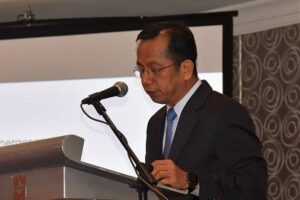THE GOVERNMENT needs to address elevated inflation to achieve its 6-7% growth target for this year, National Economic and Development Authority (NEDA) Secretary Arsenio M. Balisacan said, noting that domestic demand is being dampened by high prices.
Mr. Balisacan also expressed support for extending the reduced tariffs for pork, rice, corn, and coal to keep inflation contained.
“Inflation has always been a major concern because when high inflation persists, that discourages or depresses domestic demand,” he said at a Palace briefing.
If the government succeeds in bringing down inflation, “that will be a big boost to our domestic demand and to our growth,” he added.
Gross domestic product rose 4.3% year on year in the three months to June, the weakest reading in over two years, according to the Philippine Statistics Authority. It was weaker than the 6.4% growth posted in the first quarter and the 7.5% from a year earlier.
In its monetary policy report for August, Bangko Sentral ng Pilipinas Governor Eli M. Remolona, Jr. said growth could settle below the 6-7% target in 2023 and below the 6.5-8.0% target for 2024 and 2025 due to economic headwinds as well as the impact of cumulative monetary policy adjustments.
The economic growth target for this year remains achievable, but inflation, which could increase due to rising prices of food and oil, remains a risk, Mr. Balisacan said.
“The downside risk is inflation, especially that oil prices are (rising) again,” he said. “For staples like rice, prices on the global market are also rising.”
The government needs to ensure that it is “in good command of our policy tools,” he added. “For example, looking at enhancing the availability of (commodities) so that we can prevent untoward increases or upward pressure in prices in the near term.”
Inflation slowed for a sixth consecutive month to 4.7% in July, but economists said rising prices of oil and rice and other food items might affect the trajectory of the price index.
The central bank still expects inflation to come in within the 2-4% target range by the fourth quarter.
“And as we have seen, we have made significant progress since January in slowing down inflation,” Mr. Balisacan said, “and we would want to continue moving in that direction.”
The government’s chief economic planner also said improving business conditions and boosting the quality of jobs in the country are also necessary if growth targets are to be met.
“We are keeping watch on agencies and putting pressure on each other to ensure that we are making progress in easing business conditions,” he said. “This we have to address.”
“Remember that our goal, first and foremost, is massive investment to improve the quality of jobs,” he said, “because as an economist looking at the problem, it’s not so much anymore the jobs per se that are the problem, but the quality of the jobs.”
In July, Ibon Foundation Executive Director Sonny Africa said that of the 1.7 million jobs created since President Ferdinand R. Marcos, Jr. took office in June 2022, “1.4 million are part-time jobs.”
Mr. Balisacan said there is a need to extend the executive order that reduced tariffs on key commodities, which is set to expire in December.
He said it is “probably not the right time” to allow tariffs to revert to their former levels.
“We will have to review if the circumstances today still warrant further extending those tariff rates,” he said. “And given the situation now, as we actually see it, the world prices of rice have been rising.”
Mr. Balisacan also cited the impact of typhoons on agriculture, saying, “We have to be careful about reversing the gains.”
“The tariff reductions have been in place for almost two years now, but retail prices have not gone down proportionately,” Federation of Free Farmers National Director Raul Q. Montemayor said in a Viber message.
“It is the traders who benefit with little gain for consumers and large losses for producers.”
Mr. Montemayor also cited billions worth of foregone government revenue in the form of lower tariff collections.
“We are becoming even more dependent on imports for our basic needs,” he said. “The proposal is also a direct contradiction of the assurances given during the hearings on the Regional Comprehensive Economic Partnership (RCEP) that they will not touch the tariffs on sensitive products.”
Meanwhile, Mr. Balisacan said bringing the price of rice down to P20 per kilo — a campaign promise of Mr. Marcos — is impossible without boosting farm productivity.
“What drives low prices are increases in productivity,” he said.
Mr. Balisacan said the government and the private sector need to invest in irrigation, logistics, and other means of enhancing yields in the face of the changing climate. “Unfortunately, those cannot be done overnight,” he added.
“Prices need not be this high as you can see in other countries. Look at Thailand, Indonesia, (and) Vietnam, their prices are much lower than ours because their productivity is high,” he said. “We have neglected agriculture for decades and that’s what we are trying now to reverse.”
Mr. Balisacan said farmers will suffer if the government reduces rice prices to P20 per kilo without a corresponding boost in farm productivity.
“We should be very careful,” he said, noting that the government should look at rice market conditions as comprehensively as possible. — Kyle Aristophere T. Atienza

